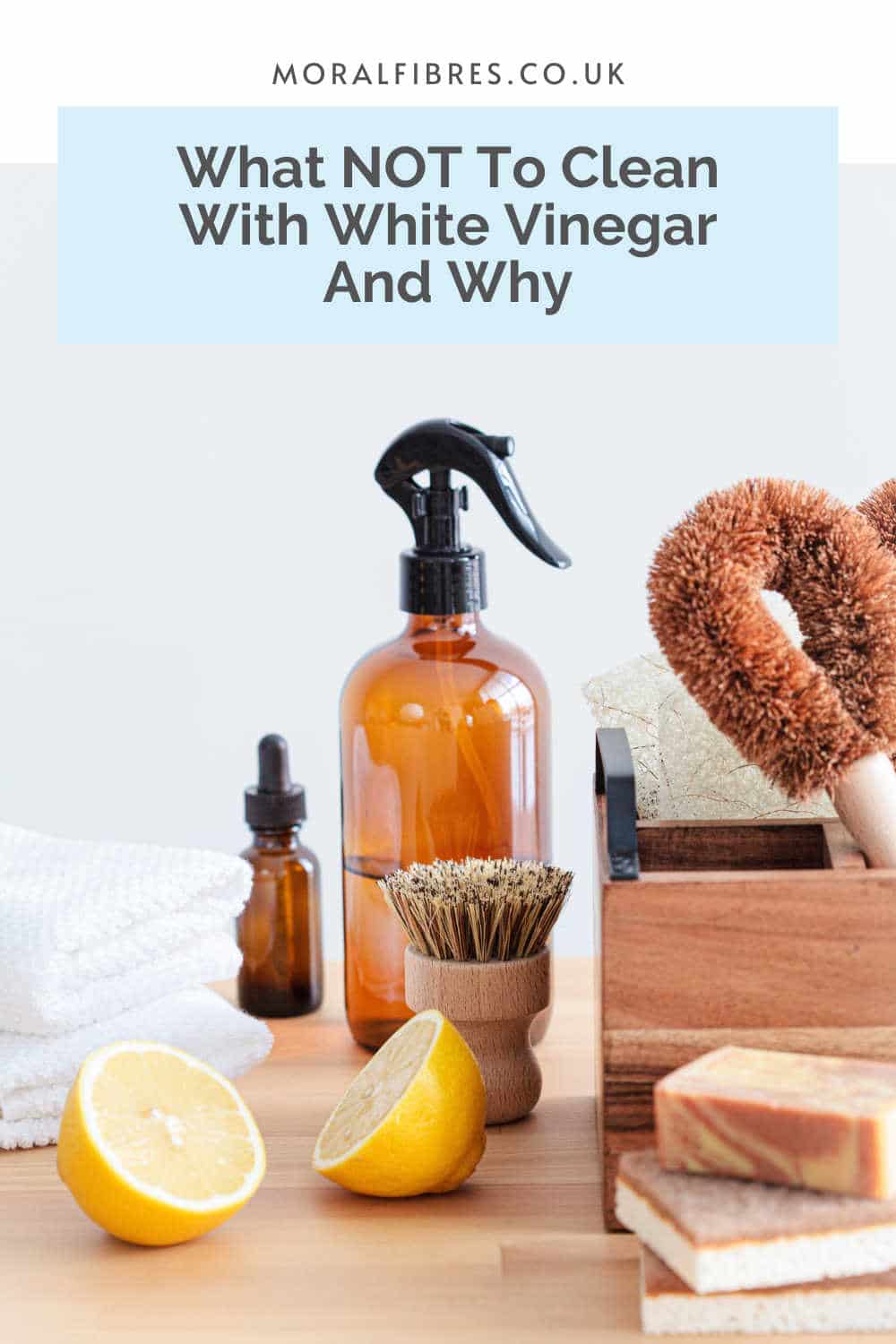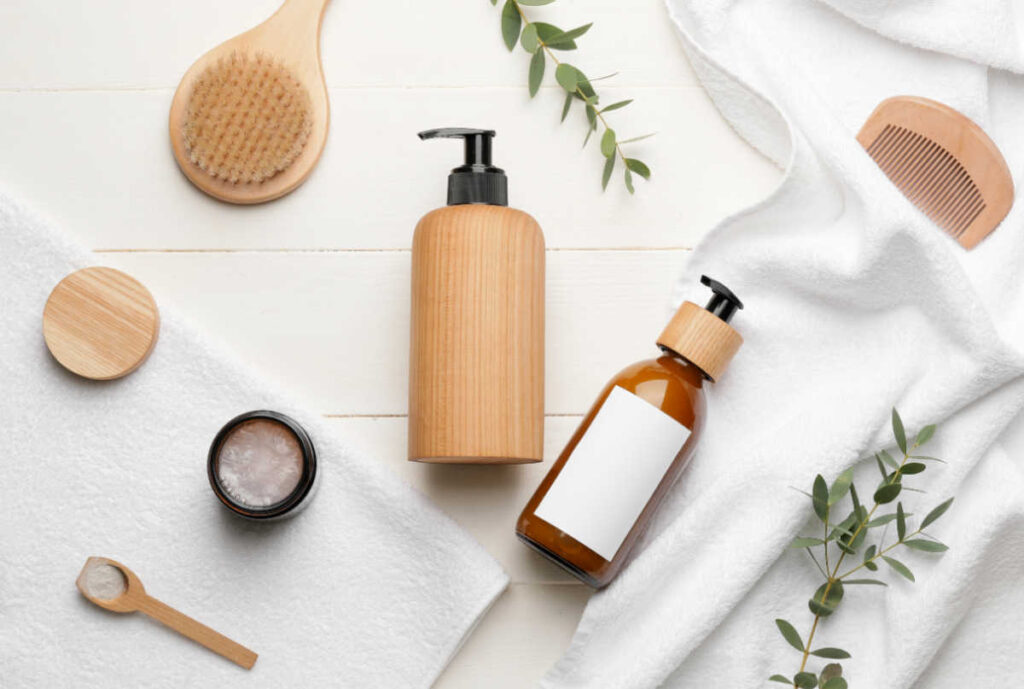What Not To Clean With Vinegar And Why
To support the running costs of Moral Fibres, this post may contain affiliate links. This means Moral Fibres may earn a small commission, at no extra cost to readers, on items purchased through these links.
Using vinegar to clean your home is cheap and effective. However, there are a few things you should keep vinegar well away from. Here’s all you need to know about what not to clean with vinegar.
Cleaning with white vinegar is a cheap, effective and non-toxic way to clean your home. It’s something I’ve turned to for almost two decades to keep my home spick and span, and will keep turning to time and time again.
However, like any cleaning product, natural or otherwise, then it’s important to know that vinegar is not a magic do-it-all product. Vinegar is acidic by nature. This means it is not suitable for use on all surfaces or items in your home and can damage some surfaces if used incorrectly.
What Not To Clean With Vinegar

Getting ready to spring clean your home the all-natural way? Before you bust out your cleaning gear, here’s all you need to know about the surfaces that you should not clean with vinegar:
Cars
It is completely fine to use vinegar to clean your car’s interior. However, it is best to avoid using vinegar and other acidic-based cleaners to clean the outside of your car.
The reason we know this is that in the 1970s and 80s, before stricter air pollution controls were in place, acid rain was a huge environmental problem. As well as damaging trees and plants, one unlikely impact of acid rain was damage to paintwork on cars. This damage included etching, discolouration, and a loss of the paintwork’s glossy lustre.
At the time, the cars most affected were those that were finished with metallic paint.
Why did this happen? Well, as the name suggests acid rain is acidic by nature. When acidic substances come into contact with the metallic paint, it reacts with the paint (which has a higher pH level). It then causes this surface damage.
Thankfully, acid rain is one environmental problem we don’t have to worry so much about anymore. However, it’s a great lesson on keeping acids, like vinegar, away from your car.
With all this chat about vinegar and paint, you might be wondering if vinegar is safe to clean painted surfaces in your home. I’ve found that vinegar is generally fine to use on painted surfaces in your home – unless you have used metallic paint. As with any cleaning product though, do a patch test in an inconspicuous area first before cleaning a wider area.
Electronic Devices
Electronic devices – such as laptops, phones or tablets – can get pretty grubby through daily use. Yet no matter how dirty they are, whatever you do then stay away from the vinegar!
Electronic screens have a layer of protective film on them. This film helps protect the screen and has anti-glare properties. The acidic nature of vinegar can damage or strip this coating, so should be avoided.
Instead, use a cleaning solution formulated for electronic devices. These solutions have a pH level that will not damage your screen.
Natural Stone
White vinegar isn’t suitable for cleaning natural stone. This is because vinegar can be corrosive to this natural material. Over a prolonged period of time, vinegar can cause etching and blemishes on the surface of the stone. The acid can also break down any protective sealants that have been applied the protect the stone. This leaves the stone prone to damage and staining.
Granite
Granite is another material that shouldn’t be cleaned with vinegar. If you have granite worktops then stick to a stone-safe cleaning solution, otherwise your shiny counters will eventually lose their shine.
Marble
In a similar vein, marble is another surface to avoid. If your kitchen worktops are made of marble, then vinegar can dull the surface. As marble tends to be light-coloured, then the other problem is that the use of vinegar can cause spills to penetrate the surface of the marble. This will leave stains that will be impossible to remove. Instead, use a stone-safe cleaning solution.
Quartz
Finally, using vinegar on quartz is best avoided. Similar to marble or granite, the acidic nature of vinegar can eat away at the quartz, causing surface damage. Vinegar can also leave the quartz prone to damage through staining.
What About Washing Machines and Dishwashers?
Some washing machine and dishwasher manufacturers advise against using vinegar in these appliances. This is due to concerns that the acidic nature of vinegar may corrode the rubber seals of your machines.
It is a valid concern. If you left rubber sitting in undiluted vinegar for a very long period, then it would certainly corrode the rubber.
Yet many of these same manufacturers and cleaning brands sell cleaning solutions for washing machines and dishwashers that are just as acidic, if not more acidic, than standard white vinegar.
For example, this cleaning brand sells this dishwasher cleaning solution that’s formulated with citric acid – a concentrated fruit acid that’s stronger than vinegar. These cleaners are also considerably more expensive than vinegar. In the face of this, it’s very hard not to be sceptical about these claims from manufacturers.
Adding a small amount of vinegar to a load of laundry or dishes, where it is diluted by water and then rinsed away by your machine, should not cause any damage to your machine. Vinegar is certainly something I have used regularly for decades, and I’ve never had a problem with the seals on my dishwasher or washing machine.
Of course, it’s up to you to use your own judgement about whether you want to use vinegar in your washing machine or dishwasher or not.
The Bottom Line
Vinegar can be used in lots of different ways around your home. It’s cheap, effective and doesn’t contain any questionable ingredients. However, as vinegar is acidic, some caution should be used over where in your home you choose to clean with it.
Keep vinegar away from your car and electronic devices, and avoid using it on natural stone surfaces, such as granite, quartz or marble, and you’re good to go and get busy with the scrubbing brush.
Some people warn against using vinegar in your dishwasher or washing machine, but we encourage you to make up your own mind on this.
Found this post useful? Please consider buying me a virtual coffee to help support the site’s running costs.




